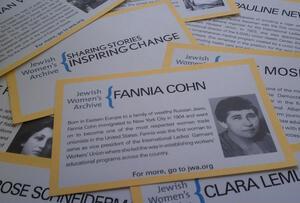Lunch with Fannia Cohn
On Sunday, I had lunch with Fannia Cohn. So did Toba Penny from Moment, Sarah Perry, Rose Zoltek-Jick, and Leah Berkenwald from the Jewish Women’s Archive, and six other guests (including one man) at Table 24. We were gathered to commemorate the centennial of the Triangle Shirtwaist Factory Fire and to celebrate Jewish women activists, past and present. Each of us was given a numbered card with a part of Fannia Cohn’s life story. Fannia died in 1961 at the age of 76.
My card, number 7, was truly destined for me (beshardt). It spoke of Cohn’s deep commitment to worker education, a passion that led her to found educational programs in New York City, Boston, Chicago, Cleveland, and Philadelphia. Having spent close to four decades at Baruch College, CUNY, I could truly identify with Cohn who was elected the first female vice president of the ILGWU.
I had not served as a vice president of a major union. Nor had I led a strike against manufacturers. I had never worked in a garment factory. But I had spent summers during my high school years earning money as a switchboard operator at a hotel in Long Beach, NY where the guests were Jewish immigrants who had become successful professionals and entrepreneurs. And, after graduate school, I had spent most of my adult life educating largely first generation in college students at Baruch College, CUNY.
For many of them, English was a second or third language as it clearly had been for Fannia who immigrated to the US from Western Russia (now Belarus) and who most probably spoke Yiddish and Russian in her home. My students did not arrive at Ellis Island. They arrived by plane instead of ship, most with little or no money.
But, like Fannia Cohn, their quest was for freedom and for opportunity. I sat at the luncheon and applauded as Ruth J Abram, Kate Frucher and Lynn Sherr were given Living the Legacy Awards. I was struck particularly by Kate Frucher’s remarks. An attorney turned entrepreneur, Kate accepted the honor with deep humility and deep gratitude. She spoke of the change in her life that occurred when she saw the jumpers from the World Trade Center Towers. She needed then, she said, to find a way “to repair the world and to repair herself.”
Kate reminded me that wherever I am in my life I should think not only about what I have done “but about what I have not done yet. Our actions, no matter how small, can bend history in the direction of justice.”
Fannia’s lesson brought home by Kate Frucher. Two stories entwined with each other.
Roslyn Bernstein is a professor of journalism and creative writing at Baruch College, CUNY. She is the author of Boardwalk Stories and Illegal Living: 80 Wooster Street and the Evolution of SoHo.







The struggle for the rights of workers (both citizens and foreigners) continues today as we have seen recently in the midwest.
Thank you for your comments, Roslyn. I truly found the post informative and inspiring. Just learning of this site, I will join. Looking forward to reading more. Thank you again.
Interesting, because it is the first time i am learning the name "Fannia Cohn"... we studied the Triangle Shirtwaist factory tragedy as students, but we never learned the stories of the women themselves (though we can all be forever grateful to them for the rights we have as workers today!)...... amazing when you think of the courage of these young women ("foreigners" in this country) struggling for what they believed was right! ... an inspiration for us all to do whatever we can, however "small" or "insignificant" it may seem at the time!